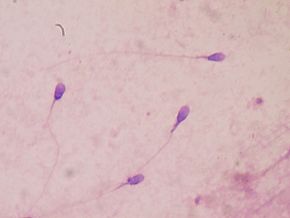
Male reproductive health is a big deal, whether it's erectile dysfunction or sperm count and quality. A huge problem is that sperm count in men has been dropping rapidly over the past few decades, and studies find that this 50% drop is occurring globally. Two recent studies found that pesticides are playing a role in these problems.
The first study found that pesticides commonly used in our homes, gardens and lawns, as well as in our foods, are contributing to the huge sperm decline. The researchers reviewed studies looking at levels of 2 types of pesticides in men. They found that men with higher levels of organophosphates insecticides or carbamates (N-methyl carbamates) had lower sperm counts (sperm concentration).
The second study found that exposure to the insecticide chlorpyrifos and other organophosphate pesticides was associated with the development of erectile dysfunction (ED). The higher the exposure levels (as measured in the person's urine), the greater the risk of ED. Erectile dysfunction is the difficulty of getting or keeping an erection.
Bottom line: Lower your pesticide exposures (and thus the amount of pesticides in your body) by not using pesticides routinely in your garden, lawn, or home. Instead, use least-toxic Integrated Pest Management in the home and garden, and avoid use of pesticides on lawns (view "weeds" and clover as wildflowers and a bee habitat). Also, eat as much organic food as possible.
1) From CNN: Common pesticides in food reducing sperm count worldwide, study says
“Over the course of 50 years, sperm concentration has fallen about 50% around the world,” said senior study author Melissa Perry, dean of the College of Public Health at George Mason University in Fairfax, Virginia.
The study, published Wednesday in the journal Environmental Health Perspectives, examined 25 studies around the world on the two chemicals and included 20 studies in the meta-analysis. Those studies looked at 42 different levels of impact among 1,774 men in 21 different study populations.
2) From Beyond Pesticides: Erectile Dysfunction Among Younger Males Linked to Pesticide Exposures
A study published in the Journal of Endocrinological Investigation finds exposure to the insecticide chlorpyrifos and other organophosphates (OPs) has a positive association with the development of erectile dysfunction (ED). Erectile dysfunction, also known as impotence, is the difficulty of getting or keeping an erection. Despite occurring in males later in life (between 40 and 70 years), recent studies highlight this issue emerging among adolescents, highlighting possible hormone imbalances not associated with age.
Scientists and health officials already associate pesticide exposure with a decrease in male fertility, including reduced sperm count, quality, and abnormal sperm development. Exposure to many pesticides also profoundly impacts the endocrine (hormone) system, including reproductive health.
Using data from the National Health and Nutrition Examination Survey (NHANES), researchers investigated urinary levels of 3,5,6-trichloro-2-pyridinol (TCPy), a metabolite of the most common OP insecticide chlorpyrifos. Researchers compared urinary levels to patients who experienced ED, responding to a questionnaire indicating if the individuals were “sometimes able” or “never able” to achieve an erection. .... However, the study highlights the increased odds of ED among individuals exposed to chlorpyrifos, with the risk of ED rising with increased exposure to the chemical.
